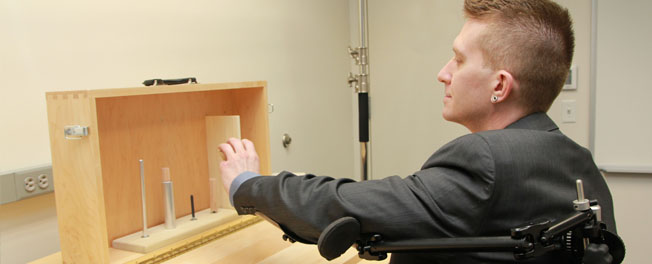
Neurorehabilitation and Applied Physiology Laboratory
General Laboratory Description
Dr. Johnson’s Neurorehabilitation and Applied Physiology (NAP) Laboratory has four primary areas of interest: (1) investigating the mechanisms underlying the formation, retention and generalization of motor skills; (2) developing novel behavioral and neuromodulatory interventions that target these mechanisms; (3) translating these interventions to restore motor function and increase community participation of individuals with neurological damage and (4) developing and/or refining clinical outcome measures to document improvements in motor function and community participation in individuals with neurological damage. He utilizes behavioral, neuromodulatory and neuroimaging methods to approach these four primary areas of research interest.
General Description of Student Activities
Through an interactive and collaborative process with Dr. Johnson and other laboratory personnel, students will engage in research topics of their own interest to generate high-quality research while also learning about the research process and enhancing research skills. Students will have the opportunity to collect, analyze and interpret data in both ongoing and new studies. In addition, students may engage in other lab activities such as literature/scoping reviews, development of assessments and/or research tools, presenting results, and writing journal articles.
Examples of Projects
- Investigate the impact of neurophysiologic and behavioral factors on the acquisition, consolidation, retention and generalization of motor skills
- Use of neuromodulatory or behavioral interventions during wake and/or sleep to enhance motor memory consolidation
- Investigate the formation and developmental trajectory of different neural representations of motor skill
- Use of behavior-based motor memory reactivation to optimize the scheduling of trials of motor learning, rehabilitation and home exercise programs
- Investigate interactions between newly formed motor memories
- Investigate ipsilateral functional impacts of stroke
- Develop a novel bimanual modified constraint-induced movement therapy intervention
- Investigate the occurrence, content and impact of dreams during the rehabilitation experience
- Learn more about the perceptions of individuals with neurological diagnoses regarding rehabilitation, occupational therapy and community participation
- Development and psychometric testing of a bimanual assessment measure (BAM) with individuals with a history of stroke
- Development and psychometric testing of functional outcome measures for use during telerehabilitation
PhD Mentor Information
Dr. Johnson’s goal is to investigate the neural mechanisms underlying motor skill learning, including the acquisition, consolidation, retention and generalization of skills, and to translate these findings to enhance and/or develop interventions to improve function and independence of individuals with neurological diagnoses. His laboratory utilizes several methods, including human behavior, surveys, neuroimaging and neuromodulation. By conducting basic, translational and clinical research, Dr. Johnson’s laboratory focuses on moving new discoveries from the bench to the bedside to enhance evidence-based rehabilitation and ultimately improve the function, independence and quality of life of individuals with neurological diagnoses.
Research Foci
- Investigate the mechanisms underlying the formation, retention and generalization of motor skills
- Develop novel behavioral and neuromodulatory interventions that target these mechanisms
- Translate these interventions to restore motor function and increase community participation of individuals with neurological damage
- Develop and/or refine clinical outcome measures to document improvements in motor function and community participation in individuals with neurological damage

